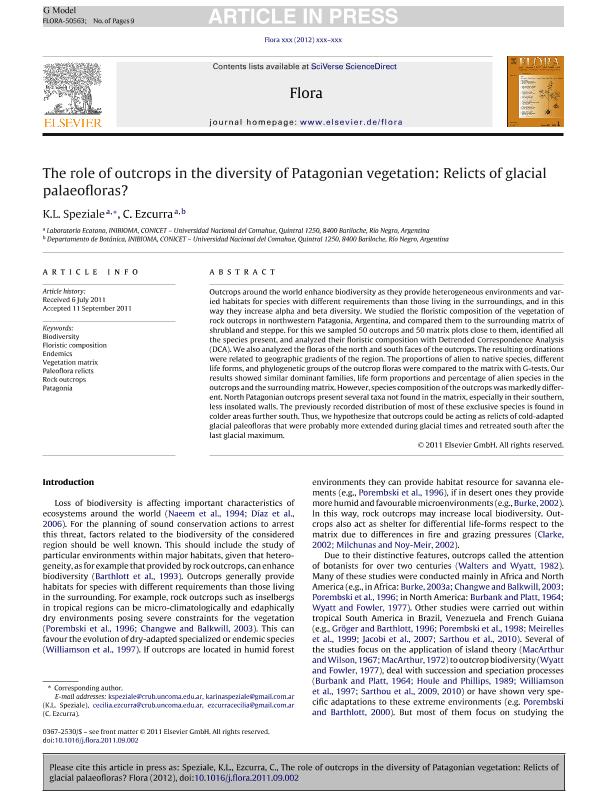Mostrar el registro sencillo del ítem
dc.contributor.author
Speziale, Karina Lilian

dc.contributor.author
Ezcurra, Cecilia

dc.date.available
2019-02-18T19:19:00Z
dc.date.issued
2012-02
dc.identifier.citation
Speziale, Karina Lilian; Ezcurra, Cecilia; The role of outcrops in the diversity of Patagonian vegetation: Relicts of glacial palaeofloras?; Elsevier Gmbh; Flora; 207; 2; 2-2012; 141-149
dc.identifier.issn
0367-2530
dc.identifier.uri
http://hdl.handle.net/11336/70373
dc.description.abstract
Outcrops around the world enhance biodiversity as they provide heterogeneous environments and varied habitats for species with different requirements than those living in the surroundings, and in this way they increase alpha and beta diversity. We studied the floristic composition of the vegetation of rock outcrops in northwestern Patagonia, Argentina, and compared them to the surrounding matrix of shrubland and steppe. For this we sampled 50 outcrops and 50 matrix plots close to them, identified all the species present, and analyzed their floristic composition with Detrended Correspondence Analysis (DCA). We also analyzed the floras of the north and south faces of the outcrops. The resulting ordinations were related to geographic gradients of the region. The proportions of alien to native species, different life forms, and phylogenetic groups of the outcrop floras were compared to the matrix with G-tests. Our results showed similar dominant families, life form proportions and percentage of alien species in the outcrops and the surrounding matrix. However, species composition of the outcrops was markedly different. North Patagonian outcrops present several taxa not found in the matrix, especially in their southern, less insolated walls. The previously recorded distribution of most of these exclusive species is found in colder areas further south. Thus, we hypothesize that outcrops could be acting as relicts of cold-adapted glacial paleofloras that were probably more extended during glacial times and retreated south after the last glacial maximum. © 2011 Elsevier GmbH.
dc.format
application/pdf
dc.language.iso
eng
dc.publisher
Elsevier Gmbh

dc.rights
info:eu-repo/semantics/openAccess
dc.rights.uri
https://creativecommons.org/licenses/by-nc-sa/2.5/ar/
dc.subject
Biodiversity
dc.subject
Endemics
dc.subject
Floristic Composition
dc.subject
Paleoflora Relicts
dc.subject
Patagonia
dc.subject
Rock Outcrops
dc.subject
Vegetation Matrix
dc.subject.classification
Otras Ciencias Biológicas

dc.subject.classification
Ciencias Biológicas

dc.subject.classification
CIENCIAS NATURALES Y EXACTAS

dc.title
The role of outcrops in the diversity of Patagonian vegetation: Relicts of glacial palaeofloras?
dc.type
info:eu-repo/semantics/article
dc.type
info:ar-repo/semantics/artículo
dc.type
info:eu-repo/semantics/publishedVersion
dc.date.updated
2019-02-12T16:54:20Z
dc.journal.volume
207
dc.journal.number
2
dc.journal.pagination
141-149
dc.journal.pais
Alemania

dc.journal.ciudad
Jena
dc.description.fil
Fil: Speziale, Karina Lilian. Consejo Nacional de Investigaciones Científicas y Técnicas. Centro Científico Tecnológico Conicet - Patagonia Norte. Instituto de Investigaciones en Biodiversidad y Medioambiente. Universidad Nacional del Comahue. Centro Regional Universidad Bariloche. Instituto de Investigaciones en Biodiversidad y Medioambiente; Argentina
dc.description.fil
Fil: Ezcurra, Cecilia. Consejo Nacional de Investigaciones Científicas y Técnicas. Centro Científico Tecnológico Conicet - Patagonia Norte. Instituto de Investigaciones en Biodiversidad y Medioambiente. Universidad Nacional del Comahue. Centro Regional Universidad Bariloche. Instituto de Investigaciones en Biodiversidad y Medioambiente; Argentina
dc.journal.title
Flora

dc.relation.alternativeid
info:eu-repo/semantics/altIdentifier/doi/https://dx.doi.org/10.1016/j.flora.2011.09.002
dc.relation.alternativeid
info:eu-repo/semantics/altIdentifier/url/https://www.sciencedirect.com/science/article/pii/S0367253011001848
Archivos asociados
